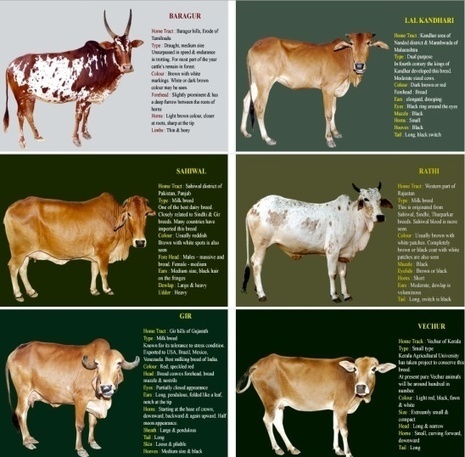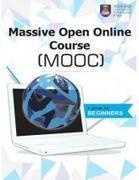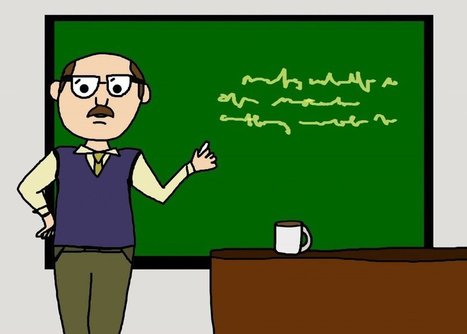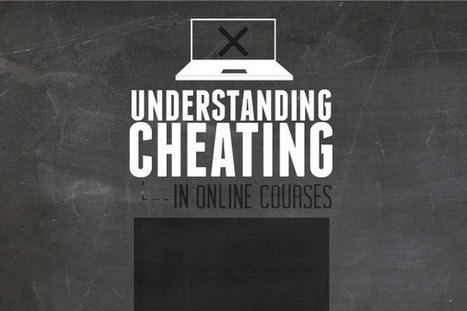 Your new post is loading...
 Your new post is loading...
Teachers and students can collaborate through social networks like Twitter, Facebook, Google, Instagram, LinkedIn, and Massive Open Online Courses. Technology and the Internet provide opportunities to collaborate for learning.
What does it mean to produce a MOOC? What are the challenges faced by professors when creating a course online? How does it feel to stand alone in front of a camera? While MOOCs have definitely the...
Via Peter Mellow
The visualization of big MOOC data enables us to see trends in student behaviors and activities around the globe, �but what is it that we are not seeing?
Via Ana Cristina Pratas
As massive open online courses move toward version 2.0, libraries are in a unique position to guide and support the future of blended learning.
Via Peter Mellow
The reasons I like MOOC are: 1- They are free of cost, flexible timings and quality course material from IVY league universities. 2- Instant feedback / review of the work/assignment I am doing. In case I face some difficulty in problem solving or assignment, I can post in forums and get all sorts of diverse answers which broadens my intellectual skills and knowledge 3- It is easy to make a study group or learning community for my friends and peers so that we help each other out. The best part of MOOC is creating a rich network of peers interested in the same topic with a diverse background and other interests. This, and the content itself, is what makes the course not only more enjoyable, but really memorable 4- Get verified certificate and add in my LinkedIn profile
Via Peter Mellow
This book is written for educators who want to leverage on the open online courses to better themselves. This book serves as a guide for beginners who wish to explore the various platforms of MOOCs, namely Coursera, iversity, edX, ALISON, Canvas Network, Open Learning, Academic Earth, Future Learn, Peer to Peer University, Saylor.Org, and Udemy. There are two chapters that first introduce to the readers what MOOC is and how MOOC can serve as a medium of learning. Each chapter then starts by simply introducing the name of the MOOC platforms that follows with descriptions of the respective MOOC platforms. Readers will appreciate the inclusion of screenshots to ease their navigation in making the most out of the online resources. It is hoped that this book will provide a resource to advocate for the best possible ways to learn from the open world.
Via Peter Mellow, juandoming
It’s move-in week this week at the state university campus across the street from where I live and where I taught for several years. This occasion always reminds of the ominous first paragraph of Don
Via Dr. Susan Bainbridge
OCR (a UK exam board and part of the University of Cambridge) have joined up with the micro-adaptive learning service provider CogBooks to take our school MOOC project, Cambridge GCSE Computing Online (www.cambridgegcsecomputing.org), to the next level for the 2014/15 school year.
Via Peter Mellow
Many questions that resounded during the panel discussions are mentioned in the report as well: "How MOOCs might or could fit in with Higher Education" (a global question and debate) and the ever reoccurring question: "how do we measure the impact of MOOCs". Where I feel the latter question is just a conundrum coming from an established order looking to calculate profit, where in fact profit resides in non-numeric and very qualitative profit. Education (in all its variety) works for everyone, whether you have self-taught learners, or kindergarden/primary/secondary/higherEd learners. Education is a primary human need, and should - in my view - not be pushed into boxes coming from production oriented analysis. And although I understand the need for benchmarks related to quality, getting education on the rails is the most important thing. Because let's face it, education in the Global North (and not related to MOOCs) still faces a lot of challenges. So any benchmarks based on a failed education in another part of the world, might not be the best structure to measure success. Produce education and rely on experienced teachers to provide content guidelines, they know. No matter where you live in the world, and experienced teacher makes a difference, knows her or his stuff and gets students inspired.
Via Peter Mellow
Дайджест докладов и статей, опубликованных в течение прошлого года для оказания поддержки продолжающегося обсуждения вопроса о MOOCs, Открытые Образовательные Ресурсы и онлайн литератур
Via Dr. Susan Bainbridge
Massive open online courses have brought education from top universities to armchair scholars across the globe. Now some are wondering whether MOOCs, as they are called, could help elevate developing nations.
Advocates say the MOOC could bring quality instruction to poverty-stricken places where university attendance is little more than a fantasy. But critics worry that the largely Western-style courses could equate to a new form of imperialism and push out more effective forms of education.
Via Peter Mellow
Live Events, Twitter Feeds, Chat Rooms, and other resources for the Understanding Cheating in Online Courses MOOC (Massively Open Online Course)
|
a) Set up distributed application server infrastructure using sockets with Netty and Java. b) Responsibilities included setting up fault tolerant network topo…
Via Peter Mellow
You recently launched the DALMOOC, which you created with a focus on improving the social experience of learners – can you tell me a bit about the structure and format you have chosen?
We call it a dual layer MOOC, but we don’t mean that in a binary sense, it’s more like saying there are two pathways to take. You can either take a structured pathway – the way that you see with a lot of MOOCs that are run, say, on Cousera or edX – and that’s a heavy teacher focus with guidance. As in, you click through to the next level.
We’ve created a second level that we’re calling more of the ‘social layer’ and we’re basically asking students to engage with one another and to create artefacts that reflect their understanding and to share those artefacts.
In the learning process we need different cycles of scaffolding – there are times when you come across a new idea completely and you can’t really create and socialise around it effectively because you just don’t know anything. So, there may be a cycle by which the learner follows a traditional structure or pathway but as soon as they become more confident they move into social and more emerging formats. In a way they’re oscillating between these two elements of the MOOC: structure and linear versus emergent and social.
Duke asked MOOC students from around the world to send in videos telling us something they learned from their course. Here's what they said.
Via Peter Mellow
What is a MOOC? If you have an interest in online/distance education or simply have researched ways to get free online courses in any subject imaginable, you certainly have come across the term “MOOC”. The Massive Open Online Course, for which the abbreviation stands, is a revolutionary platform that has been redefining the traditional model … PrepAdviser is now starting its own MOOC series and is giving you the opportunity to kick start your GMAT preparation. Don’t miss the chance to sign up for our free live online GMAT classes and get invaluable tips on the best strategies to help you ace this challenging exam!
Via Peter Mellow, ECO Project EU
Massive Open Online Courses (MOOCs) bring together a global crowd of thousands of learners for several weeks or months. In theory, the openness and scale of MOOCs can promote iterative dialogue that facilitates group cognition and knowledge construction. Using data from two successive instances of a popular business strategy MOOC, we filter observed communication patterns to arrive at the [ldquo]significant[rdquo] interaction networks between learners and use complex network analysis to explore the vulnerability and information diffusion potential of the discussion forums. We find that different discussion topics and pedagogical practices promote varying levels of 1) [ldquo]significant[rdquo] peer-to-peer engagement, 2) participant inclusiveness in dialogue, and ultimately, 3) modularity, which impacts information diffusion to prevent a truly [ldquo]global[rdquo] exchange of knowledge and learning. These results indicate the structural limitations of large-scale crowd-based learning and highlight the different ways that learners in MOOCs leverage, and learn within, social contexts. We conclude by exploring how these insights may inspire new developments in online education.
Via Peter Mellow
edX recently commissioned a study of nearly 1,000 videos, segmenting them out by by video type and production style, and discovered this among their other findings: Shorter videos are more engaging. Engagement drops after 6 minutes.Videos with a more personal feeling are more effective than high-fidelity studio recordings. Videos in which the instructor speaks quickly and with high enthusiasm are more engaging.Khan-style tablet drawings are more engaging than power point slides.
(2013). Learning online: massive open online courses (MOOCs), connectivism, and cultural psychology. Distance Education: Vol. 34, No. 1, pp. 129-136. doi: 10.1080/01587919.2013.770428
Via Dr. Susan Bainbridge
I believe firmly that the Internet is going to change education for the better. I am much more skeptical that Massive Online Courses (Open or Otherwise) are going to do to colleges and universities what digital photography did to Kodak. As I previously suggested, Ivory Tower does a good job deflating the Udacity hype, and making the case for human intervention in teaching, at least for those students who are not 100% self-motivated and self-assured (that is, those students who actually need to be educated, rather than left to educate themselves). Two relevant notes of today.
Via Peter Mellow
MOOC mania hit American colleges just a couple of years ago, after professors from MIT and Stanford University started offering free classes on the Internet and saw more than 150,000 students sign up.
Via Peter Mellow
So I want to take a step back and look at a bigger picture for a moment. The previous diagram I created was meant as more of a “learner design” perspective, in the sense that the dual paths would be the two main possibilities for learners. This was meant to look at the course from the eyes of a learner. But, the diagram breaks down in many ways since this will not be a traditional course. This course will attempt to deconstruct what it is to learn, be a learner, and to move through a course.
Via Peter Mellow
|
 Your new post is loading...
Your new post is loading...
 Your new post is loading...
Your new post is loading...













































